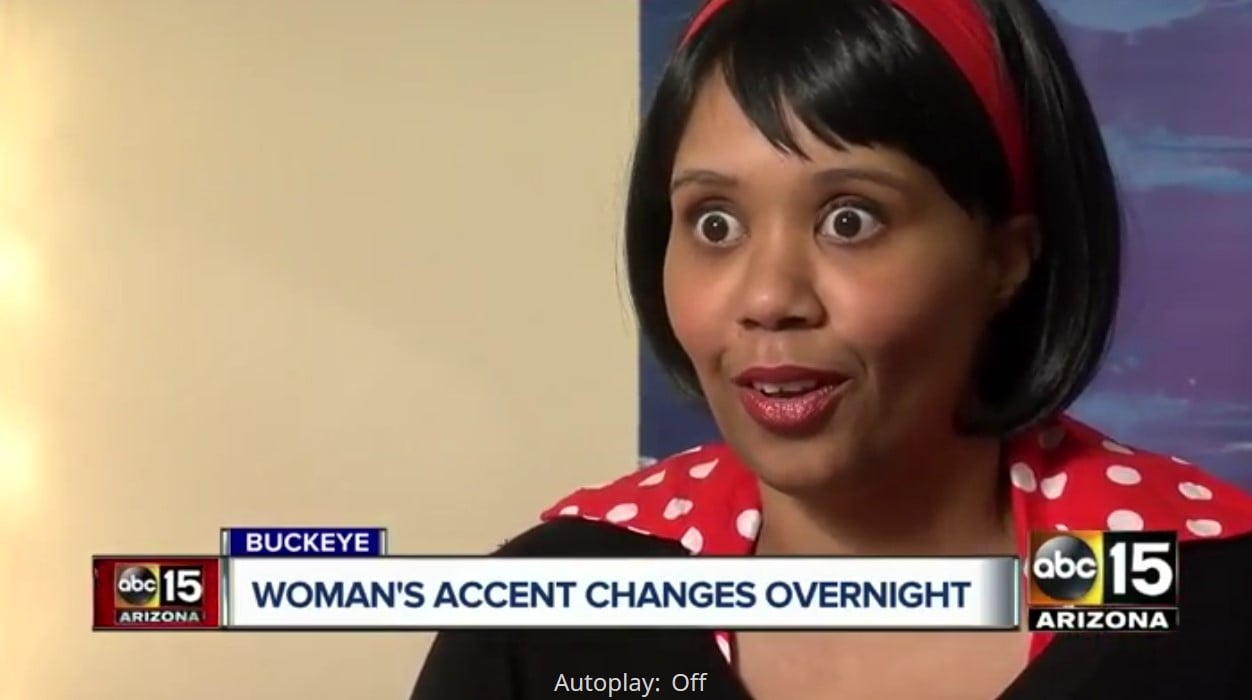A woman in Buckeye, Arizona fell asleep with a headache and woke up in the morning with a British accent.
Surprisingly, this isn’t the first time that Michelle Myers fell asleep with a headache and woke up with a different accent. The first occurrence left her sounding Irish, and the second time gave Myers an Australian accent. The British accent is the latest in her bizarre string of voice changes after she fell asleep with a headache, and she’s understandably frustrated.
“Everybody only sees or hears Mary Poppins,” she said to ABC. Myers, a former Texas beauty queen, has never left the United States, making these accent changes after she fell asleep with a headache especially perplexing.
“They send in the psychiatrist in the hospital and make sure you’re not a loon,” she continued.
According to experts in the field, what she’s suffering from is a very real thing and not fabricated in the least. Michelle Myers suffers from Foreign Accent Syndrome – an extremely rare condition that usually only happens after a stroke or other type of neurological damage.
It turns out that Michelle Myers does have a medical history that would lend itself to Foreign Accent Syndrome and cause the voice changes after she fell asleep with a headache.
“When I was a little girl I used to always go to my mom and say, ‘my bones hurt,” the Texas beauty queen stated.
Her life has been a series of trips in and out of the hospital, and she has a well-documented condition of Ehlers-Danlos syndrome. This condition is a disease that causes easy bruising, rupturing blood vessels and causing painful joints that can easily dislocate. As far as doctors can tell, it’s also this syndrome that caused her to take on different accents after she fell asleep with a headache.
With such a rare disease, there aren’t many resources dedicated to research. Little is known about Foreign Accent Syndrome other than its connection to neurological damage, and treatments for the illness aren’t currently clear. While accent changes may not be as severe as the underlying damage from other illness or medical emergencies, they do have a noted effect on Myers’ sense of self. Talking with foreign accents have had notable effects on her well-being, as a crucial part of her identity goes through a frequent flux.
While having an accent change may not seem like a big deal, Myers is saddened by the way her condition has affected her life. As she watched a video of herself speaking normally with ABC, she stated that “I’m sad…I feel like a different person. The person I am now has been through so much compared to this person.”
Myers’ chief concern is that she be taken seriously by those in her life. With such a rare condition, many people are quick to judge and label her as “crazy” or “faking” the fact that her speaking mannerisms changed so drastically after she fell asleep with a headache. While the origins of her condition aren’t currently clear other than the connection to a chronic illness, she honestly doesn’t care where the accent changes came from – only that she receives the help that she needs.
Awareness is slowly rising regarding Foreign Accent syndrome, but Myers continues to struggle.
“Some people think it’s physiological; others think it’s psychological. People like me – we don’t care which one it is. We just really want to be taken seriously and if it is something that’s going to hurt me, help me.”



